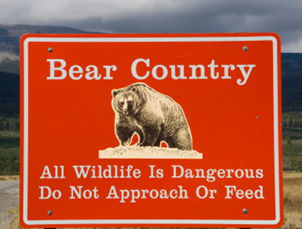 Camping is a great way to experience the outdoors. Most of the time it is safe and enjoyable, however, there are some annoyances and dangers associated with the outdoors that is necessary to be aware of.
Camping is a great way to experience the outdoors. Most of the time it is safe and enjoyable, however, there are some annoyances and dangers associated with the outdoors that is necessary to be aware of.
With a little bit of knowledge and some preparation you can maximize your safety and enjoyment while on a camping road trip. The first thing to remember is to be prepared! This isn't the Boy Scouts' motto for nothing. Being prepared can help you avoid all sorts of difficulties, inconveniences and dangers when camping.
Before you leave
Do some research and have some knowledge about the area(s) you plan to visit. Are there any particular dangers, such as certain animals, plants or insects that you might encounter? Are there seasonal dangers of which you should be aware? Before you leave home, do some Internet research and call the park rangers or the campsite(s) you plan to visit to find out.
Pack essentials. See our article What to bring with you on a tent camping trip.
On the road
Drive safely. Sounds simple, but usually it's hard to obey.
- Never drive over the speed limit
- Be cautious of other drivers
- Do not tail gate
- Use your mirrors and turn signals before moving into other lanes
Keep checking your car. Make regular checks while on the road. Regularly check your tire pressure - at least one under-inflated tire will eventually lead to the other tires becoming flat and will increase chances of tires coming apart. Under-inflation can be due to overloading, punctures with nails, air leakage through the valve cap or by natural leakage of air.
Personal factors
- Rest when not driving
- Switch drivers every few hours
- Check driver's alertness and attitude regularly
- Take regular stops along the way and let all passengers stretch their legs
At the Campground
Obey the rules
- Always use marked tent campsites
- Read and follow the campground policies and recommendations
- Never leave food out overnight
Check for potential hazards in your campsite. Check the site thoroughly for glass, sharp objects, branches, large ant beds, poison ivy, bees, and hazardous terrain.
Pitch your tent in a safe spot. Look for a level site with enough room to spread out all your gear. Do not place your tent in a low-lying area as it may be prone to flooding.
Keep an eye on your campfire. A campfire is a fun part of camping, but a fire that gets out of control can be extremely dangerous. Make sure your campfire is always attended to and build it in a suitable area at a safe distance from your tent. See our article on How to safely build a campfire.
Be cautious when using a propane stove. If you plan to use a propane stove, read the instructions that come with it and the propane cylinder. Use the stove only as a cooking appliance and like a campfire; never leave it unattended while it's burning.
Dispose of trash properly. Disposing of your trash properly helps ensure a safer campground for you, future campers and the campground's wildlife. If available, remember to recycle and never leave any trash behind in your site when you leave.
Beware when encountering wildlife. Depending on where you are camping, be aware of the threat posed by bears and other wild animals. Ask the park ranger about wild animals in the area.
Keep your campsite free of food scraps and odors and do not bring food into tents. Pack food in a bear-proof locker or canister overnight. If none are available, then put it in the trunk of your car. If this is not possible, then hang food and perishables, as well as the pots and pans you cook with, at least 200 yards away from your campsite. Never feed or approach a bear. Use a flashlight at night- many animals feed at night and the use of a flashlight may warn them away.
When out and about
Be prepared for changes in the weather. Even if it's summer, in some areas, particularly mountainous ones, the weather can change suddenly and dramatically. Bring warm and waterproof clothes.
Beware of poisonous plants. Common plants to be wary of are poison oak, sumac, and ivy. By familiarizing yourself with what these look like before you go, this will help you avoid them. Show your children pictures of them too. If in doubt, avoid touching any unknown plants.
There are products you can apply to your skin before going into the woods. If you come into contact with a poisonous plant, immediately rinse the affected area with water and apply a soothing lotion (such as calamine lotion).
Beware of environmental dangers. Excessive heat and sun can cause sunburn, dehydration and heat stroke. Severe cold weather can cause conditions such as hypothermia. Make sure you know what you should do in the event of these.
Watch out for bugs. Hornets, bees, wasps, and yellow jackets are a problem at many campsites. Avoid attracting stinging insects by wearing light-colored clothing and not wearing perfumes or colognes. Should such an insect approach, do not wave wildly and swat blindly, instead, use a gentle pushing or brushing motion to deter them.
Avoid drinking water in the wild, even if it the stream looks pristine and pure.
Following our simple set of suggestions and practicing common sense can help ensure you have a safer and more enjoyable tent camping vacation. Enjoy!
Copyright ©2012 Camping Road Trip, LLC
Find campgrounds and RV parks - Smart Search Now.
Read campground and RV park reviews to help you find the perfect place to stay.